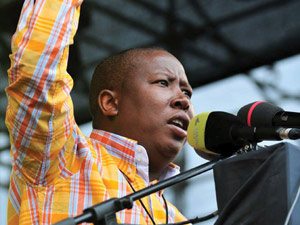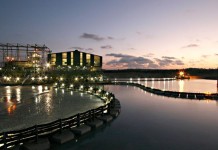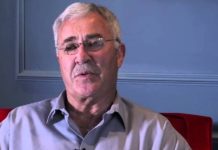
[miningmx.com] – WITH the first anniversary of the Marikana shootings upon us, there has been a noticeable uptick in the labour climate – which is to say, nothing has changed in the past year.
On July 29, the Chamber of Mines (CoM) literally strong-armed the Association of Mineworkers & Construction Union (AMCU) into arbitration proceedings by declaring a dispute with the union – unusual as it’s the unions that are the most disputatious.
By declaring a dispute, AMCU must attend arbitration hearings under the auspices of the Council for Conciliation, Mediation and Arbitration (CCMA) which is where the other unions have currently taken gold industry wage talks. So in a way, the CoM is forcing AMCU to the table.
This is only likely to fuel AMCU’s intransigence at a time when the radicalisation of wage negotiations is being hyped up again by no less than Julius Malema.
Just as AMCU has exploited the disaffection with the NUM, so Malema’s Economic Freedom Fighters (EFF) wants to take up the cudgels for a R12,500/month basic wage for entry-level miners as a means of confronting the South African government.
“One of the less covered issues is the proposed launch of the Workers & Socialists Party (WASP) which is mobilising support in the same core constituency (as the EEF).
So the lead up to the Marikana anniversary has been quite tense,’ said Simiso Velenpini, an analyst for Control Risks in Johannesburg.
“The discussion in South Africa is shifting to the left where there’s been the adoption of a more radical approach. The shift is part of an evolution in South Africa. It’s wishful thinking that the structures that were applicable in 1994 should continue unchallenged,’ she says.
“There could be a dangerous burst of strike activity towards the end of the wage negotiations as we saw with Marikana, and whipped up by organisations like the EEF,’ says Peter Attard Montalto, a strategist for Nomura International in London.
From a markets point of view, however, they have generally priced in the slew of negativity about South Africa, says Montalto, as evidenced by the rand/dollar exchange rate which, while assisting the dollar-denominated revenues of mining companies, also suggests nothing has fundamentally changed in the country’s political risk since Marikana.
“Government can’t fundamentally solve labour issues until the Tripartite Alliance partners have shifted which would allow a change in labour laws. The National Development Plan hints at it, but too subtlely,’ says Montalto.
He doesn’t see changes in South Africa’s political risk profile until the ANC sees a real threat to election success – which won’t be until 2017 at the earliest, a view with which Velenpino agrees.









